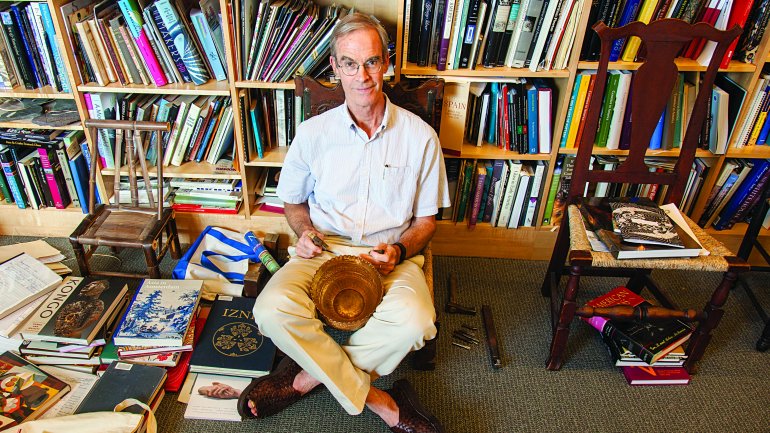Masters: Edward S. Cooke Jr.
Masters: Edward S. Cooke Jr.
When Edward S. Cooke Jr. was writing his dissertation at Boston University, he realized he was eligible to take classes – so he signed up for a woodworking course with the Program in Artisanry. “Not something you always think about when you’re writing a dissertation,” he says with a smile.
But Cooke, who was studying rural artisanal cultures – preindustrial cabinetmakers in Connecticut, to be specific – saw a bigger picture. “I had questions about the materials that I didn’t feel were being answered by a lot of scholars writing about it,” he recalls. His instructor was Thomas Hucker, who’d trained with a fifth-generation cabinetmaker. Their conversations were “incredibly important,” Cooke says, “to opening up what I could learn from contemporary makers in how we might look at the past in a totally different way.”
Today, as the Charles F. Montgomery Professor of American Decorative Arts at Yale, Cooke is a trailblazer; his approach to material culture blends the study of artifacts, social history, and the shop floor. Perhaps most distinctively, it begins with the object itself: “What I’m engaged with, more than anything else, is this idea of not object-centered scholarship – where you just zero down in on one object and sort of glorify it, talk about its aesthetic content – but how do you talk about object-driven inquiry?” Cooke explains. “What does it say about different moments in time? What does it tell us about the way people lived?”
A connoisseur, for example, might prize her ability to identify a piece of furniture, taking a kind of taxonomic approach. Cooke would be more likely to start from the inside, investigating the wood: What kind is it? How was it prepared? Slowly, he’d uncover its story. “Objects aren’t just static elements; they actually have a complex story in terms of their making. And then they have a complex story over their use or abuse over time.”
This approach has made him a nimble scholar, untethered to period or place. It has also made him an innovative educator. Among his proudest accomplishments is an art history survey course he developed. He was inspired by an urgent question: How do you break with the Western canon, which centers art history in Europe and privileges painting, sculpture, and architecture, without creating an artificial dichotomy?
The answer was literally in his hands. Focusing on rigorous looking – and touching – using ceramic, textile, metal, and wood objects from around the world allowed Cooke to break down the spurious separation between Euro-centric and non-Western art history, to offer many centers for the development of artistic production, and to overturn the hierarchy of mediums. “It’s been liberating,” Cooke says. His own work, in turn, has become increasingly global and multidisciplinary in the past 10 years.
“This has been, to me, the way in which you keep getting excited about what you do.”
On his CV: Cooke is a founding co-editor of the Journal of Modern Craft. He is also the author of three books, including Making Furniture in Preindustrial America and New American Furniture: The Second Generation of Studio Furnituremakers. His fourth is under way. The prolific scholar has also edited, authored, and co-authored numerous other publications.
Show and tell: Cooke’s office is full of books (as one might expect), but there are also many objects. “To me, it’s very symbolic,” he says; he wants his students to understand that objects are another rich source of ideas. And he likes having them close at hand to bring to class.
Along the way: Cooke has an MA from the Winterthur Program in Early American Culture in addition to his PhD, and was a curator at the Museum of Fine Arts, Boston, for seven years before returning to Yale in 1992.
Full circle: The late Charles F. Montgomery was a mentor to Cooke, awakening his interest in decorative arts and material culture as an undergraduate at Yale. Being named the university’s Charles F. Montgomery professor was a meaningful milestone.
Read more about the 2016 American Craft Council Awards and winners.




